It’s hard to believe that South Park is gearing up for its 19th season, which starts on Wednesday. When the show premiered in 1997, the following were true:
- Hillary Clinton’s greatest challenge was her president husband’s adultery, email servers being hardly a thing.
- Tiger Woods had just won his first Masters and probably didn’t even know what sex was.
- My favorite TV show was Barney, and I’d go approximately the next ten years without watching a single episode of South Park.
The early episodes of South Park are legendary for their crudeness, both in construction paper animation quality and the characteristic “toilet” humor that the show expertly meta-lampooned with Terrance and Philip, starting a long tradition of firing back at critics. No one had ever seen a television program with so little reverence and so much cultural allusion, stuffed with absurd situations and yet simultaneously tackling important issues such as gay rights, assisted suicide, and censorship. All these years later, South Park still has those traits and, more importantly, Trey Parker and Matt Stone have remained funny and fresh.
But there’s no denying that the show, despite its continued relevance as social satire, has changed profoundly since its inception, most notably through a style shift from the playful faux-innocence of the early seasons to the more mature (can South Park be mature?) self-awareness of more recent episodes. The old absurdity is still there—what other show would explain Obama’s reelection as part of a Chinese plan to acquire the rights to Star Wars?—but it’s gained a theatrical element, with everything from the increased use of dramatic music to über-sincere politicians and businessmen contributing to the new vibe. An episode like Season 16’s “Faith Hilling,” with an emphasis on modern media and the presence of earnest yet clueless governmental agents creating pointless tension, is par for South Park’s modern course—ridiculous, caustic, but definitely world-weary.
A huge part of what made the show so funny from the start was that its stars were four potty-mouthed third-graders whose otherwise naïveté allowed them to see the world more clearly than the batshit crazy adults around them. But then Cartman became a downright evil and manipulative sociopath, Stan and Kyle dealt with some serious issues that probably made them more cynical (in Stan’s case, we know he’s become more cynical), and Butters Stotch arrived on the scene as an even more naïve character to take their place.
The most essential player in South Park’s shift, though, has been Randy Marsh.
His rise in prominence is only rivaled by that of Butters and was driven by the need to fill the role of featured adult. Mr. Garrison and Chef, formerly the most insane and reasonable people on the show respectively, jointly held that title for most of South Park’s first decade. But Mr. Garrison hasn’t been terribly interesting since his reversion to male in “Eek! A Penis,” when the sexual confusion and compensatory bigotry that made him shine were finally resolved. And Chef was last seen shitting his pants in death after falling off a cliff in Season 10’s premiere (courtesy of Isaac Hayes taking offense to the notorious “Trapped in the Closet”).
With their decline, Randy stepped to the forefront and brought neither the former’s repressed sexuality or the latter’s clear rationality, replacing them with a middle-aged neurosis that undoubtedly has its roots in Parker and Stone’s own aging. They were in the 20s when they created South Park, as were many of the show’s original fans, and they’ve had to find ways to maintain a vigorous passion despite the wearying passage of time and expending energy on other incredible projects like The Book of Mormon. Randy is the cartoon manifestation of that struggle. His zany ideas and obsessions nearly always carry the distinct undertone of an attempt to recapture the lack of responsibility and immaturity that define childhood. And regardless of what’s happening in the realm of current events, Randy’s often urging for simple, irrational solutions that harken back to easier days. While Stan and his friends see the world for what it really is and behave accordingly, Randy is the part of us that lives in fantasy land and wants nothing more than to spend all our time there. And over the past several years, that desire has resonated more powerfully with both audiences and with Parker and Stone, who have used Randy at an increasing rate as the centerpiece of their episodes.
It’s gotten to the point where Randy Marsh can and should be called the star of South Park. He was voted by the show’s fans as the 2015 BRO DOWN Champion (essentially their favorite character), narrowly beating Cartman. He’s been a regular participant in the show’s most memorable moments of the past five years. Over the past two seasons’ twenty episodes, nearly half have featured Randy as a main character—and even in bit parts he nonetheless manages to steal the spotlight. For example, the main plot of last year’s episode “The Cissy” was forgettable (Cartman put his typical selfish twist on transgender rights), but it will forever be known as the birthplace of the “Randy is Lorde” storyline that made waves on global social media. Individual episodes as a whole might generate more buzz on a case-by-case basis (“200-201,” “World War Zimmerman,” and “Go Fund Yourself” are among the more recent ones to incite heavy responses), but Randy is single-handedly able to create memorable moments in a way that no other character can really accomplish—not even Cartman and Butters, whose shtick has grown a little boring.
Of course, a superstar is not born overnight. Randy has been built into his current dominant, relatable self over the long course of South Park, and I went back and tracked every significant episode in his development to try to determine how, why, and when he dethroned Eric Cartman as the emblematic character of the show.
Randy Marsh first appeared in “Volcano,” the third episode of the entire series, as the town geologist.
His first line, as he spotted the wildly gesticulating needle of the seismograph: “What the heck is this?” There was already characteristic Randy stupidity, as he called “Frank” and asked what the moving needle meant. But then he went away for the rest of the episode, which stars Jimbo and Ned (both of whom have faded into the background in recent years) alongside the boys.
He was first identified as Stan’s dad in “An Elephant Makes Love To A Pig,” two episodes later, but this didn’t become significant until Season Two’s “Clubhouses,” Randy’s debut significant role. And even then, he was present mostly through his absence, as his separation from Sharon created an inconvenience for Stan, who had to deal with his mom’s new partner Roy. This wasn’t remotely similar to the separation Randy and Sharon undergo in Season 15’s “You’re Getting Old,” which posed an existential threat to the show’s universe. Still, though, we got to see Randy driving a convertible and rediscovering his glory days with an interest in younger women. More importantly, we saw that he and Sharon have a rollercoaster relationship whose hills and valleys are only exacerbated by his ridiculousness.
Randy had two major appearances in Season 3: “Spontaneous Combustion” and “Two Guys Naked In A Hot Tub.” In the first of these, he presented the absurd strategy of farting more as the solution to South Park’s burning issue, but it feels like a conclusion any Parker and Stone-created scientist would reach—there’s no classic Randy ridiculousness or obsession, and to boot he’s totally overshadowed by a crucified Cartman in this episode. In the latter episode, Randy and Gerald Broflovski masturbated in front of each other, creating an awkward situation that explored men’s comfort with their sexuality, but once again it wasn’t particularly definitive of Randy’s character (except perhaps laying foundations of his insecurity). In a later season, Stephen Stotch probably would have fit the scenario better.
The first “classic” Randy moment didn’t come until Season 4’s “Something You Can Do With Your Finger.”
Finally we get some absurd anger over a trivial subject; finally we get Randy slipping into an alter ego that takes him back twenty years; finally Randy himself is the inanity in the episode. He even has a trademark freakout when he discovers that Stan was continuing to sing in Fingerbang even after Randy had forbidden it. But the most crucial aspect of this episode is that after Randy tells his son all about The Ghetto Avenue Boyz’ rise and demise, he says, “Now I’m a joke.” This is the real root of Randy’s fantasy-laden antics that have driven his character for the past fifteen years: a profound uncertainty of his place in the world, in his marriage, and in his purpose. His attempts to escape these doubts lead him to delve into obsessions and take up disparate personas, fulfilling the very real dream of forfeiting all responsibility and returning to childhood that exists within a huge segment of the adult male population that watches South Park. The only unifying value he seems to hold across his wide world of shenaniganery is his desire to be a good father to Stan and Shelley—again, something much of the audience probably holds dear—alternating between strict discipline and joining his son in pseudo-youth. In “Something You Can Do With Your Finger,” Randy puts both tactics on display, moving from immovable, unexplained fury at Stan to joining Fingerbang onstage at the mall.
So, at long last, Randy was on track to becoming Randy. But it still took awhile for his personality to gain a significant presence for a few reasons. Seasons 5-9 saw Butters ascend to prominence—probably the single greatest character decision Trey and Matt have made, because not only did Butters’ role as outcast/bitch of the group add enormous comedic value, but he also gave Cartman a natural pawn and serial victim just as he was morphing into the sociopath we know today. The Cartman-Butters dynamic was, at its peak, a guarantee for a classic episode whenever it was featured (“Casa Bonita,” “AWESOM-O,” “The Death of Eric Cartman,” et cetera). And even when the show focused on adult characters, Mr. Garrison and Chef still received most of the attention—this was the era of Mr. Slave, the most ridiculous human character conceived in the show’s history, and Chef therefore had all the more reason to play the voice of reason. Randy did get a few shining moments in this period of South Park:
- He chopped off Future Stan’s hand in “My Future Self n’ Me” to keep up the lie that the man really was Stan from the future.
- He led the liberal crowd in a rock protest song in “I’m A Little Bit Country.”
- He got suckered into Wall-Mart, Mormonism, and a pile of naked men.
But Season 9 was where Randy first started to prove that he could carry an episode on his own, first in “The Losing Edge” and then in “Bloody Mary.” The former, even with a hysterically funny A-plot that featured Kyle’s cousin Kyle brought in to help the boys’ baseball team lose, completely unleashed Randy’s potential as a moronic lead. It also gave us his first truly memorable quote, and arguably his most memorable to this day:
And “Bloody Mary,” in which Randy was diagnosed as an alcoholic, hypochondriacally interpreted it as terminal-type illness to rationalize his continued drinking, and finally was “cured” by a statue of Virgin Mary that bled from its ass/vagina, took Randy’s previously demonstrated puerility and focused the plot entirely on it for the first time in the show’s history. All the elements of his personality—his tendency to obsession and overreaction, his penchant for booze, his rocky relationship with his family despite that often leads to desperate attempts to connect with Stan and Sharon—were put on full display, and it worked. Yet “Bloody Mary” isn’t quite as venerated in the South Park pantheon as later Randy-centric episodes, most likely because it became most notable not for its focus on Randy but for the backlash it caused in the Catholic community. In retrospect, it capped off a particularly offensive and impactful run of shows in late 2005 that included “Ginger Kids” and “Trapped in the Closet,” two of the most influential episodes in South Park history in terms of societal effect.
Still, though, the foundation for Randy’s rise had been laid, and over the next few seasons he continued his upward development. He was the cherry on top of Season 10’s “Make Love Not Warcraft,” with his dying cry of “STANNNNNNN” echoing into the halls of TV eternity. He played an even more consistent role in Season 11, scoring a couple of amazing features in “With Apologies to Jesse Jackson” and “More Crap” alongside beautiful bit parts that involved him blowing a guy’s head off with a shotgun, taking Stan to a secret cult of bunny-worshippers, and getting addicted to everyone’s favorite video game, Heroin Hero. By the end of Season 12, which had seen him both take his family out to California only to end up soaking a room with ectoplasm and celebrate Obama in the amazing 2008 election special, his importance to South Park’s humor was undeniable. “Randy episodes” were lauded by fans and critics alike and served as the highlights of what would be a slight decline in the show’s quality over Seasons 13 and 14–“200” and “201” were highly controversial but not all that funny, “The Coon” trilogy didn’t hold a candle to the three parts of “Imaginationland,” and South Park’s tropes started to feel a little stale.
Then “You’re Getting Old” happened, and all of a sudden Randy Marsh gained surprising new depth behind his antics. We got to see him break out the Steamy Ray Vaughn persona, alternately farting and playing guitar in perhaps his most insane attempt at grasping back for lost youth.
But far more significant was his conversation with Sharon after she catches him doing it:
Sharon: You do this all the time! First you’re obsessed with baseball fights! Then you need to play Warcraft! Then you gotta be a celebrity chef!
Randy: Why can’t you ever just support me?!
Sharon: Support what?! Another stupid dream of yours?!
Randy: Face it Sharon, our son turned 10 and you feel old!
Sharon: WHAT does our son turning 10 have to do with you making the same mistakes again and again?!
Randy: Because I’m unhappy, okay?! I’ve been unhappy for a long time! [Sharon reflects on this for a moment and her voice goes soft]
Sharon: I’m unhappy too. We both are, obviously. How much longer can we keep doing this? It’s like, the same shit just happens over and over and, then in a week it just all resets until- it happens again. Every week it’s kind of the same story in a different way but it, it just keeps getting more and more ridiculous.
Randy: I don’t know if I’ve changed or you have. I just feel like I might not have a whole lot of time left and… I want to enjoy it.
Sharon: I want to enjoy it too, but… I can’t fake it anymore. You just seem kind of shitty to me.
Randy: You kind of seem shitty to me too.
Sharon: People get older, Randy. People grow apart.
These are the sincerest lines Randy has spoken since “Something You Can Do With Your Finger.” The gig is up and he finally must face the reality that’s been driving his increasingly asinine behavior: he can’t take the passage of time in stride. With his son diagnosed as a “cynical asshole” and Sharon at long last fed up with him (she had hinted at this in “Medicinal Fried Chicken” and “Crème Fraiche,” two Randy episodes that held up Seasons 13 and 14), he’s caught in the middle, unable to connect with either. For South Park’s longtime fans, the ones who had followed the show since their 20s and were facing these very same issues fifteen years later, this message had to hit home. Even at age 19, I was moved by “You’re Getting Old,” and felt a sympathy for Randy that hadn’t existed when he was just a caricature. The ending scene of the episode, with Fleetwood Mac’s “Landslide” playing as Randy moves out and Stan descends into a depression, generated feels that hadn’t been seen before and haven’t been seen since in the show’s universe.
In the aftermath of “You’re Getting Old,” South Park had the opportunity to move in an entirely different direction, one that would have involved a serialized plot and brought Stan and Randy’s existential crises to the forefront. But in an indication of how important Randy had become to the show, Parker and Stone chose to ensure that he would continue to star by reverting back to the old status quo by the end of “Ass Burgers,” the very next episode. In 2015, with so-called cartoon “sadcoms” like Bojack Horseman and Rick and Morty earning critical acclaim based on the combination of sincerity and cynicism displayed in “You’re Getting Old,” maybe Randy and Sharon would have stayed divorced and South Park would have found a way to evolve. Animated television audiences were absolutely prepared for that to happen. But instead, Randy got back together with Sharon, who resolved to deal with his ridiculousness, and he responded a few episodes later with “Broadway Bro Down,” in my estimation the most recent of South Park’s masterpieces.
This brings us, finally, to last year’s Season 18, which featured the serialization that many viewers thought would come after “You’re Getting Old.” And Randy, from his Lorde impersonation/alter ego to his “cock magic” fascination, carried the show. Cartman still had his moments and as always the current events references were on point, but there’s no way any other character could have put the show on their back the way Randy did. They aren’t as deep, they aren’t as relevant to South Park’s audience, and, quite frankly, they aren’t as funny.
Given his recent hijinks, it’s amazing that just four years ago Randy Marsh was grappling openly with the underlying unhappiness that undoubtedly still lurks below everything he does. But even though that anguishing moment has passed, the show’s fans can’t forget its impact on the depth of Randy’s character. Everything he has done from that point forward, including his starring role in Season 18, takes place within the new paradigm of Randy’s desperate quixotic search for a lasting passion and his oft-conflicting desire to do what’s best for his family. And that internal conflict comes with age, and it’s something that South Park and its fans have been dealing with for quite some time. In a way, Randy has become a meta-character, the spirit of the show. While Cartman, Kyle, Stan, and Kenny still get lots of screen time and make important points, none of the boys can reach the audience—or Parker and Stone—the way Randy can. That’s what makes him the undisputed star of South Park.
No one knows what Comedy Central’s most dynamic duo has up their collective sleeve for Season 19 (and they’ve got no shortage of low-hanging fruit to pick). But Randy Marsh gives us all a reason to be excited for it.

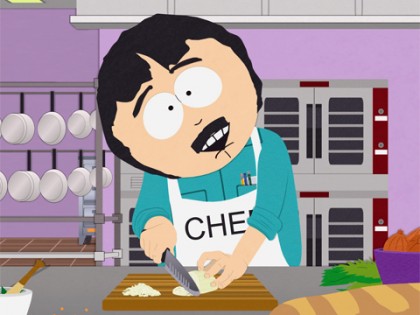
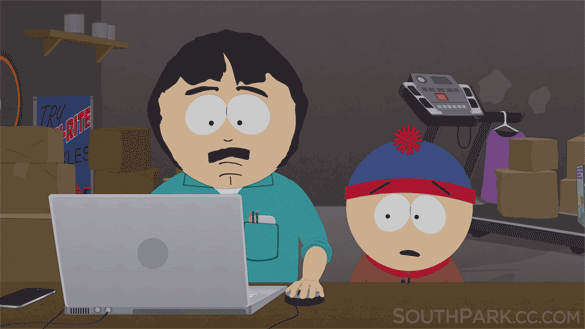
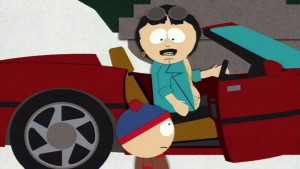

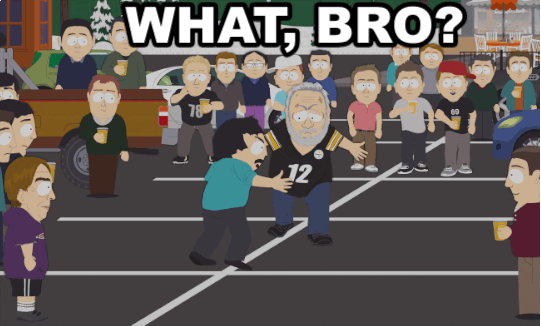
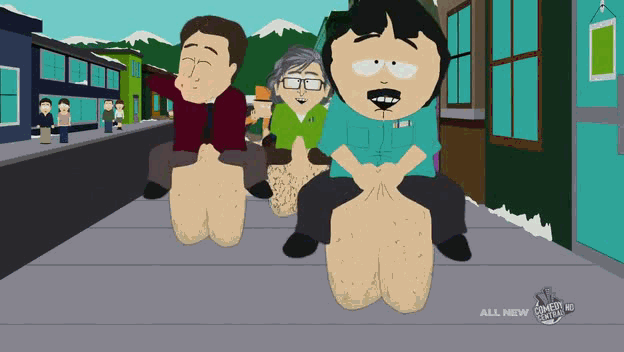
One comment